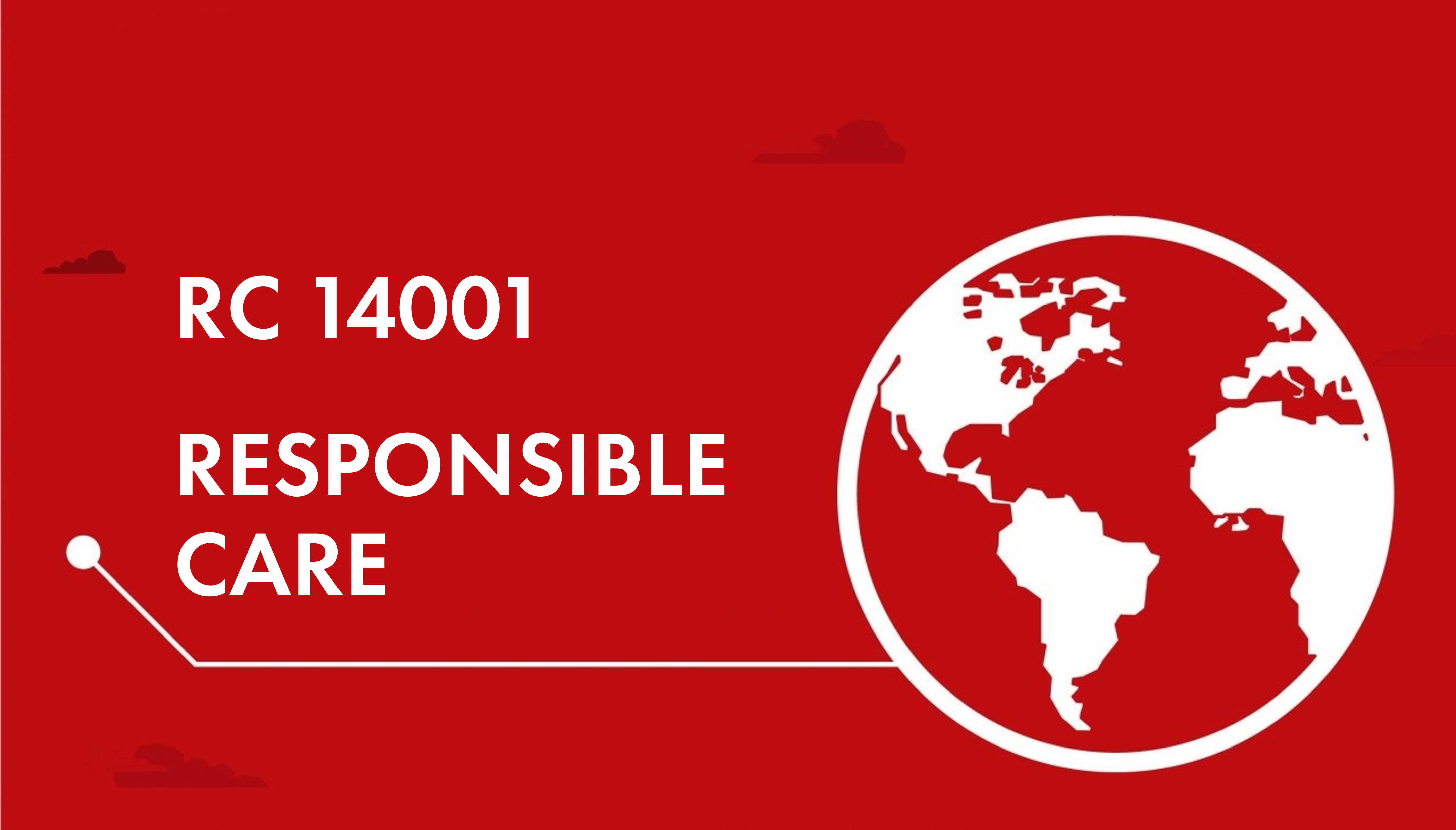
RC 14001: Elevating ISO 14001 with Advanced Environmental, Health, Safety, and Security measures
27th Feb, 2024
In the chemical industry, the imperative for surpassing benchmarks in environmental management, health and safety, and security is increasingly critical. RC 14001 emerges as a pivotal standard, integrating the rigorous environmental management system framework of ISO 14001 with the forward-thinking principles of the American Chemistry Council’s Responsible Care program. This certification signifies a profound commitment to sustainable and ethical business practices, setting a benchmark for companies aiming for compliance, leadership, and innovation in environmental stewardship and safety. This blog provides a comprehensive overview of RC 14001, underscoring its role as a foundational element for organizations dedicated to making a meaningful societal and environmental impact.
.
What RC 14001?
The RC 14001:2015 Technical Specification merges the solid framework of ISO 14001’s environmental management system with the Responsible Care® initiative, forming an all-encompassing standard for performance in environmental, health, safety, and security aspects. This certification reflects an organization’s dedication to surpassing standard regulatory requirements by fostering ongoing enhancement and adhering to ethical practices, with a keen focus on sustainability, safety, and the welfare of the community. It acts as a crucial instrument for businesses to navigate risks, boost operational effectiveness, and showcase their commitment to corporate responsibility, thereby establishing a standard of excellence within the chemical sector and beyond
.
What’s the difference? RC 14001 & ISO 14001:
While both RC 14001 and ISO 14001 serve as benchmarks for establishing environmental management systems, RC 14001 takes a step further by incorporating a broader spectrum of considerations. Below are the enhancements that RC 14001 introduces over ISO 14001, emphasizing its comprehensive approach to environmental, health, safety, and security (EHS&S) management:
- Holistic EHS&S Framework: RC 14001 expands beyond the environmental focus of ISO 14001 to also encompass health, safety, and security aspects. This broader perspective ensures a more integrated approach to managing an organization’s operational impacts, elevating the standard for EHS&S.
- Strengthened Stakeholder Relations: Unlike ISO 14001, RC 14001 places greater emphasis on fostering meaningful engagement with stakeholders through effective and transparent communication. This commitment to building trust and facilitating shared objectives in EHS&S surpasses the engagement strategies typically found in ISO 14001.
- Advanced Performance Metrics: RC 14001 sets forth a more rigorous framework for evaluating and reporting organizational performance. By establishing detailed metrics, it promotes a culture of continuous improvement that goes beyond the compliance focus of ISO 14001.
- Commitment to Ethical Practices: RC 14001 highlights the integration of EHS&S values into corporate governance, advocating for ethical leadership and sustainable practices. This focus on ethical governance represents an enhancement over the principles outlined in ISO 14001.
- Specific Security Strategies: Acknowledging the unique challenges of the chemical industry, RC 14001 specifies tailored security measures to mitigate potential risks. This approach provides a more detailed and comprehensive protection plan for assets, personnel, and communities than what is typically addressed by ISO 14001.
By integrating these key advancements, RC 14001 not only aligns with ISO 14001’s environmental management principles but also champions a more inclusive commitment to health, safety, security, and sustainability. This enriched approach positions RC 14001 as a leading standard for EHS&S management, pushing the boundaries of excellence in the chemical industry and beyond
.
Key Components of RC 14001:
This standard is characterized by several fundamental aspects that elevate organizational practices towards sustainable and responsible operations. Let’s take a closer look on these Key components:
- Holistic EHS&S Framework: Broadens the scope of ISO 14001 to include considerations for health, safety, and security, deepening the organization’s commitment to comprehensive responsibility.
- Active Stakeholder Interaction: Emphasizes the importance of transparent and open communication with stakeholders, essential for building mutual trust and driving forward sustainable initiatives.
- Targeted Improvement Strategies: Implements a structured approach to setting and achieving ambitious EHS&S objectives, utilizing detailed metrics to ensure ongoing progress in both operational efficiency and environmental stewardship.
- Ethical Leadership Integration: Aligns EHS&S objectives with the core of corporate governance, placing ethical practices and sustainability at the heart of strategic decision-making.
- Advanced Security and Risk Controls: Adopts rigorous security protocols tailored to the unique demands of the sector, enhancing the organization’s preparedness and protective measures.
- Adherence to Responsible Care® Ideals: Affirms a strong commitment to the principles of Responsible Care®, underscoring a deep-rooted dedication to safeguarding the environment, ensuring safety excellence, and promoting community well-being.
By integrating these fundamental aspects, RC 14001 not only complements the ISO 14001 standard but significantly enriches it with a deeper commitment to EHS&S excellence. Organizations that adopt RC 14001 showcase their dedication to leading-edge practices in sustainability, safety, and community stewardship, establishing new benchmarks for industry leadership.
.
Requirements of RC 14001:
- Broad Environmental and EHS&S Mandates: Specific Calls for a broad pledge towards environmental sustainability, alongside ensuring health, safety, and security, promoting a cohesive approach to overseeing corporate duties.
- Engagement with Stakeholders and Transparency: Requires active and open engagement with all relevant stakeholders, promoting transparency and collaboration in pursuit of sustainable and safe practices.
- Continuous Improvement and Strategic Metrics: Demands the implementation of a continuous improvement cycle, leveraging innovative strategies and metrics for the ongoing enhancement of EHS&S performance.
- Sustainable Leadership and Ethical Practices: Emphasizes the integration of ethical considerations and sustainability into the strategic decision-making process, ensuring leadership practices that prioritize EHS&S objectives.
- Detailed Security and Risk Mitigation Measures: Enforces strict security and risk management strategies tailored to the unique challenges of the industry, aiming to protect both the organizational assets and the surrounding community.
- Adherence to the Principles of Responsible Care®: Encourages a strong alignment with the Responsible Care® initiative, reflecting a profound commitment to environmental protection, operational safety, and community health improvement.
.
How to get RC 14001 certification?
- Gap Analysis: Conduct an in-depth assessment of the existing Environmental Management System (EMS) against the rigorous standards of RC 14001. Identify areas requiring improvement or adjustment to align seamlessly with the RC 14001 standards.
- Establishment of Environmental Management System (EMS): Develop a tailored EMS aligned with the broader spectrum of RC 14001. Implement policies, procedures, and processes meticulously designed to address environmental nuances, health and safety hazards, and security imperatives.
- Integration of Responsible Care® Principles: Incorporate Responsible Care® principles into operations. Prioritize process safety, pollution prevention, and community engagement, showcasing a commitment to responsible and sustainable business practices.
- Training and Awareness: Engage comprehensive training programs emphasizing EMS 14001, internal auditor training, and RC 14001 awareness training. Foster a profound understanding of the EMS and RC 14001 requisites across all levels of the organization, empowering the workforce to actively contribute to sustainability and safety.
- Documentation and Recordkeeping Protocols: Maintain meticulous documentation. This serves as tangible evidence of adherence to RC 14001 standards and commitment to continual improvement, supporting transparency and readiness for external audits.
- Internal Audits and Reviews: Conduct periodic internal audits. Gauge the efficacy of EMS implementation, address non-conformities, and drive continual improvement in environmental management practices.
- External Certification Audit: Undergo a rigorous external audit by certified third-party auditors. Demonstrate compliance with RC 14001 standards and alignment with Responsible Care® principles, validating efforts towards sustainability and responsible business conduct.
- Continuous Improvement and Recertification: Commit to ongoing compliance with RC 14001 standards. Embrace a culture of continuous improvement, showcasing resilience and dedication to environmental sustainability and corporate social responsibility.
.
Benefits of RC 14001.
- Enhanced Environmental Performance: RC 14001 certification aids organizations in improving their environmental performance by integrating Responsible Care® principles into their management systems. This results in better resource management, reduced waste, and prevention of pollution.
- Greater Regulatory Compliance: Compliance with RC 14001 standards ensures that organizations meet and surpass regulatory requirements, reducing the risk of penalties, fines, and legal liabilities related to environmental violations.
- Enhanced Reputation and Brand Value: RC 14001 certification showcases a dedication to environmental responsibility and sustainable practices, improving corporate reputation, attracting environmentally conscious customers, and enhancing brand value.
- Increased Operational Efficiency: Implementing RC 14001 encourages a culture of continuous improvement, resulting in streamlined processes, reduced costs, and improved operational efficiency.
- Stakeholder Confidence and Trust: RC 14001 certification instils confidence and trust among stakeholders, including customers, investors, regulators, and communities, by demonstrating commitment to environmental stewardship and ethical business practices.
- Access to New Markets and Opportunities: RC 14001 certification opens doors to new markets and business opportunities by meeting the sustainability requirements of clients, partners, and supply chain stakeholders.
- Contribution to Sustainable Development Goals (SDGs): Adhering to RC 14001 standards allows organizations to contribute to global sustainability initiatives and help achieve Sustainable Development Goals (SDGs) related to environmental protection, health, and well-being.
.
Conclusion:
RC 14001 integrates ISO 14001 with Responsible Care® principles, elevating environmental, health, safety, and security standards. Emphasizing stakeholder engagement, advanced metrics, and tailored security, it ensures compliance and sets new benchmarks for excellence. Embracing RC 14001 signals commitment to improvement, resilience, and responsible corporate citizenship, guiding organizations toward sustainability and competitive advantage in today’s business landscape.
.
How 4C Consulting can help you to implement RC 14001 in your Organization?
4C Consulting is your reliable partner for organizations stepping into RC 14001 implementation with a special focus on tailoring RC 14001 training and consulting services to individual organizational needs, we bring over 15+ years of proven expertise across various sectors with 1000+ Clients and 1500+ successful implementations and Certifications in various industries. Our commitment extends to guiding and supporting companies in understanding and effectively applying RC 14001 standards. Choosing 4C means choosing a dedicated partner for achieving environmental excellence through RC 14001 compliance. Allow us to lead your organization towards success in environmental stewardship. Contact us today.
